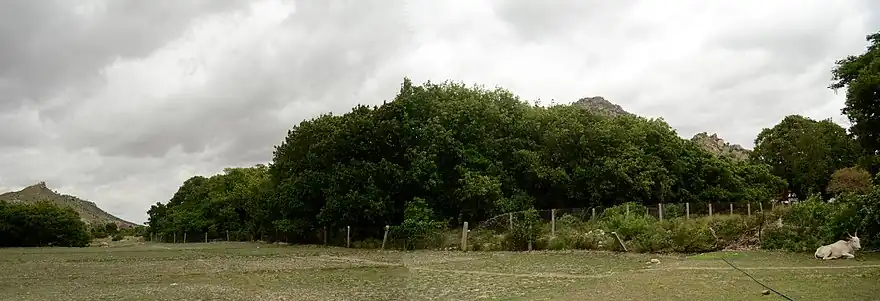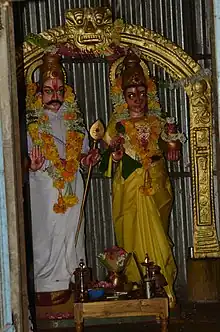Thimmamma Marrimanu
14°1′40.80″N 78°19′30.37″EThimmamma Marrimanu (Telugu: తిమ్మమ్మ మర్రిమాను, lit. "Thimmamma's Banyan Tree") is a banyan tree in Anantapur, located about 25 kilometers from Kadiri, Andhra Pradesh, India. It is probably a specimen of Ficus benghalensis. In the Telugu language, "marri" denotes "banyan" and "manu" denotes "trunk".[1][2] Its canopy covers 19,107 m2 (4.721 acres),[3][4][5] and it was recorded as the largest tree specimen in the world in the Guinness Book of World Records in 1989.[3][6][7] The tree is revered by the people of Dharmic religions alike, namely, Hinduism, Buddhism, Jainism, and Sikhism.
| Thimmamma Marrimanu | |
|---|---|
.JPG.webp) | |
| Species | Banyan (Ficus benghalensis) |
| Location | Anantapur, Andhra Pradesh, India |
Legend

According to a local myth, the tree is named after Thimmamma, a woman who committed sati (suicide by throwing herself on the funeral pyre of her husband's dead body). The tree is said to have originated from one of the poles used in the funeral pyre.[8]
Religious significance

The great banyan tree is revered by the people of Indian-origin religions such as Hinduism (including Vedic, Shaivism, Dravidian Hinduism), Buddhism, Jainism, and Sikhism. A small temple dedicated to Thimmamma is beneath the tree. The residents of the region strongly believe that if a childless couple worships Thimmamma they will beget a child in the next year. A large jatara is conducted at Thimmamma on the day of the Shivaratri festival, when thousands flock to the tree to worship it.[9]
Recordation
The tree was first noticed and revealed to the world by Regret Iyer (Sathyanarayana Iyer), a freelance journalist and photographer from Bangalore, Karnataka, India, who made all efforts to have the tree recorded in the Guinness Book of World Records as "World's largest Banyan Tree" in the 1989 edition.[10]
A Telugu-language historical novel Sri Veeraiah Nayakuni charitra (Thimmammamarrimanu kata) (Telugu: శ్రీ వీరయ్య నాయకుని చరిత్ర) was written and published by academic S. S. Giridhar Prasad Roy, in 1989. He translated and published the same story with the title The Story of Thimmamma Marrimanu in 2012.
Thimmamma Marrimanu was discussed in the second segment of the BBC series 'The Tree Spirits' (29 August 2017).[11]
References
- C. Sudhakar; R. Suguna Kumari (2008). Women and Forestry. The Associated Publishers. ISBN 978-81-8429-081-3. Retrieved 5 June 2012.
- Lavanya Vemsani (31 October 2006). Hindu and Jain Mythology of Balarāma: Change and Continuity in an Early Indian Cult. Lewiston, New York: Edwin Mellen Press. ISBN 978-0-7734-5723-2. Retrieved 5 June 2012.
- Matthews, Peter; Dunkley McCarthy, Michelle; Young, Mark (CON) (October 1993). The Guinness Book of Records 1994. Facts on File. ISBN 978-0-8160-2645-6. Retrieved 5 June 2012.
- Confer "Banyan Trees". Backpacker-backgammon.com. Backpacker-Backgammon. Archived from the original on 2012-07-10. Retrieved 2012-07-10.
- Confer "Thimmamma Marrimanu". anantapur.com. Retrieved 2017-01-04.
- India Today. Living Media India Pvt. Ltd. 1992. p. 53. Retrieved 5 June 2012.
- Sayeed, Vikhar Ahmed. "Arboreal Wonder". Frontline. Retrieved 5 June 2012.
- M.A. Mannan (2013-01-02). "550-year-old banyan tree in Andhra Pradesh enters Guinness Book as largest tree in world". India Today 31 August 1992.
- Various. Tourist Guide to Andhra Pradesh. Sura Books. pp. 44 et seq. ISBN 978-81-7478-176-5. Retrieved 5 June 2012.
- "Largest canopy on a living tree".
- "BBC World Service - Heart and Soul, the Tree Spirits, the Tree Spirits: Thimmamma Marrimanu".